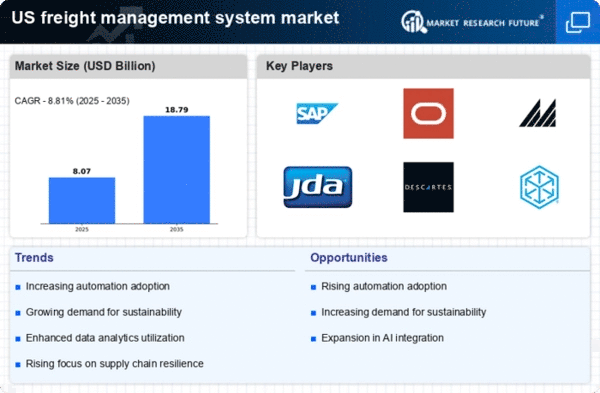Rising E-commerce Demand
The freight management-system market experiences a notable surge in demand due to the rapid growth of e-commerce in the US. As online shopping continues to gain traction, logistics and freight services must adapt to handle increased shipment volumes. In 2025, e-commerce sales in the US are projected to reach approximately $1 trillion, necessitating efficient freight management solutions. This trend compels companies to invest in advanced freight management systems to streamline operations, optimize routes, and enhance delivery speed. Consequently, the freight management system market is expected to expand. as businesses seek to improve their logistics capabilities to meet consumer expectations.
Technological Advancements in Logistics
Technological innovations play a pivotal role in shaping the freight management-system market. The integration of technologies such as IoT, AI, and blockchain enhances visibility and efficiency in supply chain operations. For instance, IoT devices enable real-time tracking of shipments, while AI algorithms optimize route planning and inventory management. The freight management system market is expected to grow. at a CAGR of around 10% from 2025 to 2030, driven by these advancements. Companies that leverage these technologies can reduce operational costs and improve service quality, thereby gaining a competitive edge in the logistics sector.
Regulatory Compliance and Safety Standards
The freight management-system market is significantly influenced by the need for compliance with stringent regulatory frameworks and safety standards in the US. Regulations such as the Federal Motor Carrier Safety Administration (FMCSA) guidelines necessitate that logistics companies adopt robust freight management systems to ensure adherence. Non-compliance can result in hefty fines and operational disruptions, prompting businesses to invest in systems that facilitate compliance tracking and reporting. As regulations evolve, the freight management system market is anticipated to grow. as companies prioritize safety and compliance in their logistics operations.
Demand for Real-time Visibility and Transparency
The freight management system market is driven. by the demand for real-time visibility and transparency in supply chain operations. Customers and businesses alike expect timely updates on shipment status, which necessitates the implementation of advanced tracking systems. In 2025, approximately 70% of logistics companies are expected to adopt real-time tracking technologies to enhance customer satisfaction and operational efficiency. This trend indicates a shift towards more transparent logistics processes, compelling companies to invest in freight management systems that provide comprehensive visibility throughout the supply chain.
Increasing Fuel Costs and Sustainability Initiatives
Rising fuel costs are a critical driver impacting the freight management-system market. As fuel prices fluctuate, logistics companies are compelled to seek more efficient transportation solutions to mitigate costs. This situation has led to a growing emphasis on sustainability initiatives, prompting businesses to adopt eco-friendly practices. The freight management system market is expected to benefit. from this shift, as companies invest in systems that optimize fuel consumption and reduce carbon footprints. In 2025, it is estimated that logistics companies could save up to 15% in fuel costs by implementing advanced freight management solutions.
















